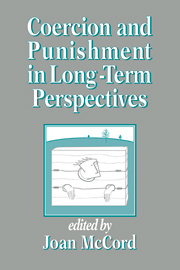Book contents
- Frontmatter
- Contents
- List of contributors
- Acknowledgments
- 1 Introduction: coercion and punishment in the fabric of social relations
- I Mental health, coercion, and punishment
- II Family socialization practices and antisocial behavior
- III Aggression and coercion in the schools
- IV Deviance, crime, and discipline
- V Measuring and predicting in studies of coercion and punishment
- 19 Corporal punishment in everyday life: an intergenerational perspective
- 20 Coercive family process and delinquency: some methodological considerations
- 21 Sex roles as coercion
- Name index
- Subject index
19 - Corporal punishment in everyday life: an intergenerational perspective
Published online by Cambridge University Press: 29 September 2009
- Frontmatter
- Contents
- List of contributors
- Acknowledgments
- 1 Introduction: coercion and punishment in the fabric of social relations
- I Mental health, coercion, and punishment
- II Family socialization practices and antisocial behavior
- III Aggression and coercion in the schools
- IV Deviance, crime, and discipline
- V Measuring and predicting in studies of coercion and punishment
- 19 Corporal punishment in everyday life: an intergenerational perspective
- 20 Coercive family process and delinquency: some methodological considerations
- 21 Sex roles as coercion
- Name index
- Subject index
Summary
Introduction
The influence of parents' disciplinary history on their everyday use of punishment of children has been the topic of much discussion. However, making generalizations on the basis of empirical investigations is limited by one or more of the following: (1) the focus has been on abuse rather than on both milder and stronger forms of punishment; (2) clinical groups or selected samples rather than representative samples have been used; and (3) data have often been taken from surveys rather than prospectively collected. The data to be presented here extend over a period of 25 years for a normal group of Swedish subjects and their parents, encompassing regularly collected information about parents' punishment of their children from infancy throughout adolescence, in addition to information about the parents' own punishment history, as well as the subjects' conceptions of their punishment history.
A review of the project
Grasping the course of development in different domains, as well as the impact of parental discipline, requires following an intact group of children over a long time. The planning of such a longitudinal study started in 1954 and was conducted at the Child Clinic at Karolinska Hospital in Stockholm (Karlberg et al., 1959; Klackenberg, 1981). The recruitment of subjects took place in Solna, one of the many communities around Stockholm. The community had an occupational distribution in keeping with that of Stockholm.
- Type
- Chapter
- Information
- Coercion and Punishment in Long-Term Perspectives , pp. 315 - 347Publisher: Cambridge University PressPrint publication year: 1995
- 26
- Cited by



